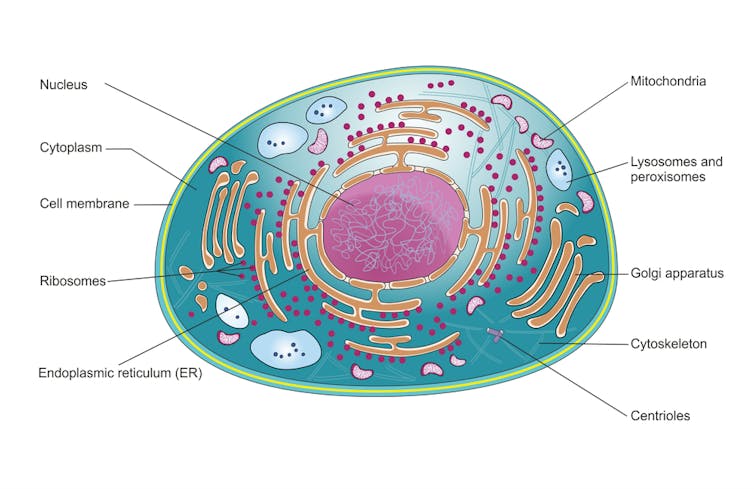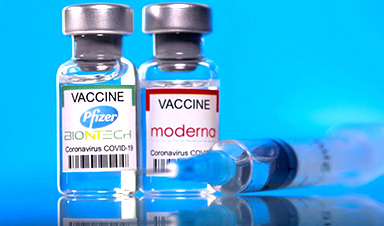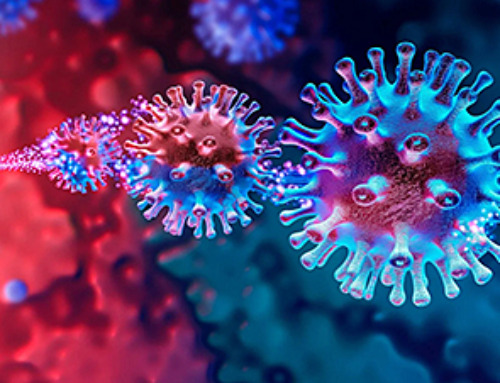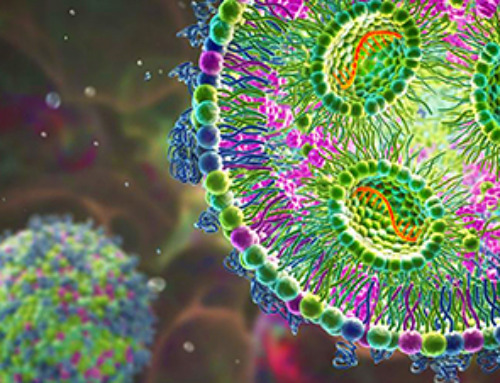The Pfizer and Moderna vaccines are set to become the mainstay of Australia’s COVID-19 vaccine rollout as the year progresses, according to the latest government projections released this week.
From September, up to an average 1.3m doses of the Pfizer vaccine plus another 125,000 doses of the yet-to-be approved Moderna vaccine are expected to be available per week. These figures are set to rise from October, as use of the AstraZeneca vaccine drops.
Both the Pfizer and Moderna vaccines are mRNA vaccines, which contain tiny fragments of the genetic material known as “messenger ribonucleic acid”. And if social media is anything to go by, some people are concerned these vaccines can affect their genetic code.
Here’s why the chances of that happening are next to zero and some pointers to how the myth came about.
Remind me, how do mRNA vaccines work?
The technology used in the Pfizer and Moderna vaccines is a way of giving your cells temporary instructions to make the coronavirus spike protein. This protein is found on the surface of SARS-CoV-2, the virus that causes COVID-19. The vaccines teach your immune system to protect you if you ever encounter the virus.
The mRNA in the vaccine is taken up by the cells in your body, ending up in the liquid inside each cell known as the cytoplasm. Our cells naturally make thousands of our own mRNAs all the time (to code for a range of other proteins). So the vaccine mRNA is just another one. Once the vaccine mRNA is in the cytoplasm it’s used to make the SARS-CoV-2 spike protein.
The vaccine mRNA is short-lived and is rapidly broken down after it’s done its job, as happens with all your other mRNA.

Here’s why the mRNA can’t insert into your genetic code
Your genetic code is made up of a different, but related, molecule to the vaccine mRNA, known as DNA, or deoxyribonucleic acid. And mRNA can’t insert itself into your DNA for two reasons.
One, both molecules have a different chemistry. If mRNAs could routinely insert themselves into your DNA at random, this would play havoc with how you produce proteins. It would also scramble your genome, which is passed on to future cells and generations. Life forms that do this would not survive. That’s why life has evolved for this not to happen.
The second reason is vaccine mRNA and DNA are in two different parts of the cell. Our DNA stays in the nucleus. But vaccine mRNA goes straight to the cytoplasm, never entering the nucleus. There are no transporter molecules we know of that carry mRNA into the nucleus….
News
COVID-19 still claims more than 100,000 US lives each year
Centers for Disease Control and Prevention researchers report national estimates of 43.6 million COVID-19-associated illnesses and 101,300 deaths in the US during October 2022 to September 2023, plus 33.0 million illnesses and 100,800 deaths [...]
Nanomedicine in 2026: Experts Predict the Year Ahead
Progress in nanomedicine is almost as fast as the science is small. Over the last year, we've seen an abundance of headlines covering medical R&D at the nanoscale: polymer-coated nanoparticles targeting ovarian cancer, Albumin recruiting nanoparticles for [...]
Lipid nanoparticles could unlock access for millions of autoimmune patients
Capstan Therapeutics scientists demonstrate that lipid nanoparticles can engineer CAR T cells within the body without laboratory cell manufacturing and ex vivo expansion. The method using targeted lipid nanoparticles (tLNPs) is designed to deliver [...]
The Brain’s Strange Way of Computing Could Explain Consciousness
Consciousness may emerge not from code, but from the way living brains physically compute. Discussions about consciousness often stall between two deeply rooted viewpoints. One is computational functionalism, which holds that cognition can be [...]
First breathing ‘lung-on-chip’ developed using genetically identical cells
Researchers at the Francis Crick Institute and AlveoliX have developed the first human lung-on-chip model using stem cells taken from only one person. These chips simulate breathing motions and lung disease in an individual, [...]
Cell Membranes May Act Like Tiny Power Generators
Living cells may generate electricity through the natural motion of their membranes. These fast electrical signals could play a role in how cells communicate and sense their surroundings. Scientists have proposed a new theoretical [...]
This Viral RNA Structure Could Lead to a Universal Antiviral Drug
Researchers identify a shared RNA-protein interaction that could lead to broad-spectrum antiviral treatments for enteroviruses. A new study from the University of Maryland, Baltimore County (UMBC), published in Nature Communications, explains how enteroviruses begin reproducing [...]
New study suggests a way to rejuvenate the immune system
Stimulating the liver to produce some of the signals of the thymus can reverse age-related declines in T-cell populations and enhance response to vaccination. As people age, their immune system function declines. T cell [...]
Nerve Damage Can Disrupt Immunity Across the Entire Body
A single nerve injury can quietly reshape the immune system across the entire body. Preclinical research from McGill University suggests that nerve injuries may lead to long-lasting changes in the immune system, and these [...]
Fake Science Is Growing Faster Than Legitimate Research, New Study Warns
New research reveals organized networks linking paper mills, intermediaries, and compromised academic journals Organized scientific fraud is becoming increasingly common, ranging from fabricated research to the buying and selling of authorship and citations, according [...]
Scientists Unlock a New Way to Hear the Brain’s Hidden Language
Scientists can finally hear the brain’s quietest messages—unlocking the hidden code behind how neurons think, decide, and remember. Scientists have created a new protein that can capture the incoming chemical signals received by brain [...]
Does being infected or vaccinated first influence COVID-19 immunity?
A new study analyzing the immune response to COVID-19 in a Catalan cohort of health workers sheds light on an important question: does it matter whether a person was first infected or first vaccinated? [...]
We May Never Know if AI Is Conscious, Says Cambridge Philosopher
As claims about conscious AI grow louder, a Cambridge philosopher argues that we lack the evidence to know whether machines can truly be conscious, let alone morally significant. A philosopher at the University of [...]
AI Helped Scientists Stop a Virus With One Tiny Change
Using AI, researchers identified one tiny molecular interaction that viruses need to infect cells. Disrupting it stopped the virus before infection could begin. Washington State University scientists have uncovered a method to interfere with a key [...]
Deadly Hospital Fungus May Finally Have a Weakness
A deadly, drug-resistant hospital fungus may finally have a weakness—and scientists think they’ve found it. Researchers have identified a genetic process that could open the door to new treatments for a dangerous fungal infection [...]
Fever-Proof Bird Flu Variant Could Fuel the Next Pandemic
Bird flu viruses present a significant risk to humans because they can continue replicating at temperatures higher than a typical fever. Fever is one of the body’s main tools for slowing or stopping viral [...]





















